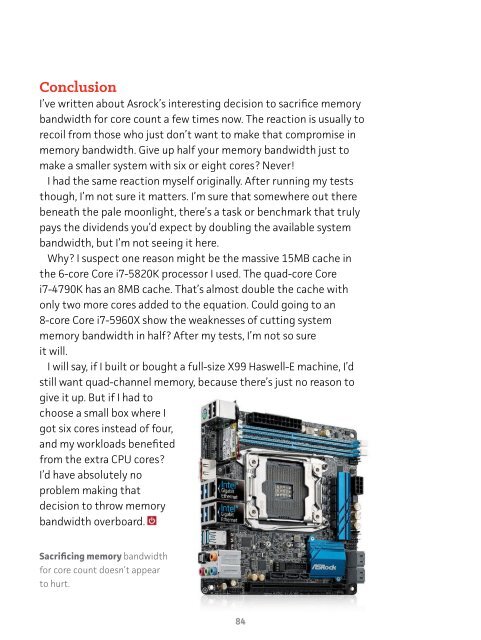Create successful ePaper yourself
Turn your PDF publications into a flip-book with our unique Google optimized e-Paper software.
Conclusion<br />
I’ve written about Asrock’s interesting decision to sacrifice memory<br />
bandwidth for core count a few times now. The reaction is usually to<br />
recoil from those who just don’t want to make that compromise in<br />
memory bandwidth. Give up half your memory bandwidth just to<br />
make a smaller system with six or eight cores? Never!<br />
I had the same reaction myself originally. After running my tests<br />
though, I’m not sure it matters. I’m sure that somewhere out there<br />
beneath the pale moonlight, there’s a task or benchmark that truly<br />
pays the dividends you’d expect by doubling the available system<br />
bandwidth, but I’m not seeing it here.<br />
Why? I suspect one reason might be the massive 15MB cache in<br />
the 6-core Core i7-5820K processor I used. The quad-core Core<br />
i7-4790K has an 8MB cache. That’s almost double the cache with<br />
only two more cores added to the equation. Could going to an<br />
8-core Core i7-5960X show the weaknesses of cutting system<br />
memory bandwidth in half? After my tests, I’m not so sure<br />
it will.<br />
I will say, if I built or bought a full-size X99 Haswell-E machine, I’d<br />
still want quad-channel memory, because there’s just no reason to<br />
give it up. But if I had to<br />
choose a small box where I<br />
got six cores instead of four,<br />
and my workloads benefited<br />
from the extra CPU cores?<br />
I’d have absolutely no<br />
problem making that<br />
decision to throw memory<br />
bandwidth overboard.<br />
Sacrificing memory bandwidth<br />
for core count doesn’t appear<br />
to hurt.<br />
84







